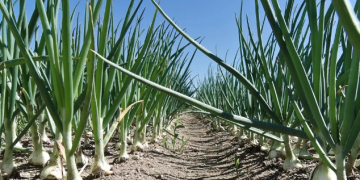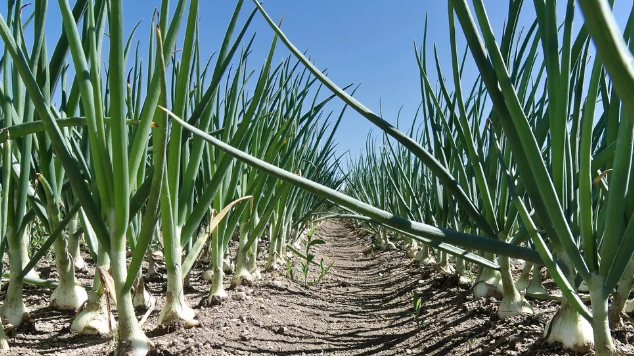#Cebolla #Postharvest #Technology #Sustainable #Agriculture #Ergonomic #Workstations #EnvironmentalImpact #AgricultureInnovation #Agro-industrialDevelopment
In the pursuit of minimizing work-related risks, improving conditions, and reorganizing postharvest activities of onions in the Bonaerense del Río Colorado Valley, a technology has been developed to optimize the onion production process. This innovative station, a collaborative effort between the National Institute of Agricultural Technology (INTA) and industrial designers from the National University of La Plata, not only aims to enhance worker well-being but also brings agronomic advantages to soil utilization. The development of this postharvest station reflects a holistic approach, considering the environmental, social, economic, and regulatory dimensions of the onion value chain.
The postharvest station for onions in the Bonaerense del Río Colorado Valley is a highly transportable and functional solution. It comprises nine workstations, with six dedicated to descaling and three for bagging. The station is easily folded and transported to the fields along with chemical toilets using agricultural carts, trailers, or truck trailers. Once at the site, the chemical toilet is set up, and the station is assembled with its sorting modules and canvas covers. The station is strategically positioned at the head of the fields, while the 500 kg big bags are arranged in rows.
The station’s implementation can significantly improve working conditions for onion harvesters who currently face health risks due to prolonged exposure to the sun, wind, and cold. Moreover, it addresses issues like muscular and joint pain caused by poor posture and ocular problems resulting from contact with onion acids. By providing ergonomic workstations for descaling, classification, and bagging, the technology aims to reduce the risk of health-related issues among workers.
Furthermore, the adoption of this technology leads to substantial environmental benefits. The postharvest station helps prevent soil erosion, which is crucial for an area already affected by strong winds. It promotes soil conservation by concentrating waste in designated areas, enabling composting and reducing soil compaction.
Impact on the Agricultural Sector
The Valle Bonaerense del Río Colorado is known for its agricultural machinery manufacturing history and existing technological capabilities. The station’s design takes advantage of the region’s expertise in this sector, presenting an opportunity for local suppliers and associated artifacts like big-bag sacks and chemical toilets to flourish. By engaging with local stakeholders and incorporating their feedback during the prototype evaluation process, the project fosters a sense of ownership and commitment from the farming community.
From a productivity perspective, a single hectare can accommodate two postharvest stations, two chemical toilets, and provide employment for 18 workers. The streamlined processes offered by the station allow for efficient time and space management while maintaining ergonomic work positions. Trials have indicated that 500 kilograms of onions can be sorted and bagged in 17 minutes, assuming the same descaling times as the current practices. Considering 80 big bags per hectare, this means two working days for nine operators. The innovative station demonstrates advantages not only in terms of work conditions but also in environmental and commercial aspects.
Innovating for a Sustainable Future
Onion production in the Bonaerense del Río Colorado Valley faces numerous challenges due to its complex, fragmented, and unsustainable supply chain. Fluctuating demand in both domestic and international markets adds to the sector’s uncertainties. To address these issues effectively, innovative solutions backed by government support are essential.
The development of the postharvest station exemplifies a disruptive approach to reorganizing onion production and marketing processes for the benefit of all stakeholders involved. By promoting discussions and collaboration among producers, labor organizers, consumers, and technology providers, the project paves the way for a more sustainable and efficient onion industry.
The journey towards a more sustainable and ergonomic onion production system involves integrating the knowledge and expertise of all relevant actors. With the support of the State, this technology has the potential to transform the onion industry in the Bonaerense del Río Colorado Valley, promoting better working conditions and fostering economic growth for the region.
The design and implementation of this postharvest station represent a crucial step towards achieving a more sustainable and resilient agricultural future, making it an essential model for similar innovations in other agricultural sectors.































